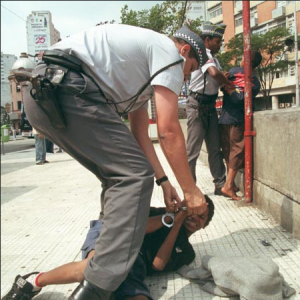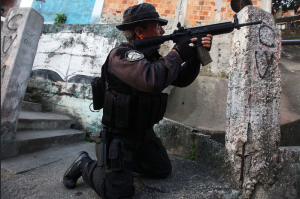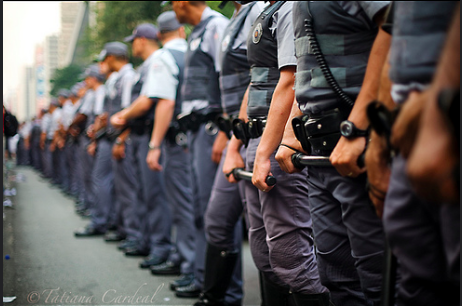Previously heralded for its meteoric economic growth, Brazil is now in a perpetual state of economic and social chaos. Recently, police in the state of Espirito Santo have gone on strike to protest low wages and long work hours. As a result, mass violence has broken out. Nearly 100 have been found dead and widespread looting as gone unchecked. The backdrop for such violence is a two yearlong recession that has hit government employees the hardest. Currently, the Temer administration has said it reached a deal with police, yet they have not gone back to work.
The violence in Espirito Santo is not an isolated incident. Fans who were entering Brazil to watch the 2016 Olympics were greeted with a sign that read, “Welcome to Hell. Police and firefighters don’t get paid, whoever comes to Rio De Janeiro will not be safe”. The police and other essential service people in Brazil have not received proper wages since the beginning of the two year recession that has hit Brazil.

https://flic.kr/p/5GuPEL
Espirito Santo’s capital Victoria is facing continuous waves of violence as police strikes have gone on for weeks. Interestingly, under the Brazilian constitution, it is illegal for police to go on strike. As a way to circumvent this, friends and family of police members have barricaded the exit for patrol cars, preventing any forces from protecting the city. As a response to this police officers simply stopped going to work. Although a federal court ruled that the police officers action were against the law, officers have yet to return to work. The state police chief was fired, which has also not stopped the officers from striking. In response to the alleged agreement the government reached, the wife of a police officer stated, “they [the government and police officers] cannot sign an agreement between them. This is a movement led by the wives of officers and none of us were there. The movement continues”. The protests also spread to Brazil’s capital, Rio de Janeiro, as protesters blocked several stations.
As the government ignores the requirement to raise wages to account for inflation, it fell upon the families of police officers to fight for their rights. Inflation has reached 11 percent last year, putting the families of officers in a financially difficult position. Alessandra Xavier, a wife of a police officer stated, “The Governor thought that he wasn’t going to have to give us anything because we’re just a small band of women without any knowledge or power”. Yet the family members of police officers have proved how much the state relies on the police to maintain order and security.
The federal government has begun to deploy troops as a means of guarding the city, yet it’s not proven enough to end the violence. The city has reported 29 million dollars in damages thanks to mass looting across the city. Schools and businesses have been closed since the beginning of the strike. Carjacking’s, mugging, murder and looting are just a few of the illegal activates that citizens have engaged in since the strike. While the people of Victoria have felt like “hostages”. Jamily Bonatto, a citizen of Victoria commented, “We’re still full of fear – my kids can’t go to school, we’re prisoners inside our house.” Citizens have also begun to question the state of Brazil society if a weeklong protest has resulted in such widespread murder.
More broadly, Brazil has been experiencing a a two year long recession as a result of corruption.

https://flic.kr/p/CKf48
The state of Espirito Santo is so bankrupt that it is months behind on paying police and nurse salaries and for basic utilities. The speaker of the lower house of Congress in Brazil recently stated that Brazil risks collapse if it does not commence severe economic reforms. Part of the reason police wages have been hit so hard is because the government voted to freeze public spending in inflation-adjusted terms. As expressed by Otaviano Canuto, the executive director for Brazil and many other Latin American countries at the World Bank, Brazil’s recession is a result of high debt to GDP ratio, which was negatively impacted by government fiscal policy. Ultimately, Canuto finds that Brazil must rely on a loosening of monetary policy to reduce inflation and bring Brazil out of the downward phase of its credit cycle.
The family members of police officers have proved how much power ordinary citizens have, regardless of their education or wealth. Cabo Noé da Matta, vice-president of the police union, stated, “the women are the radicals”. In order to protest the unjust wages and get around the law which makes it illegal for police to go on strike, family members were willing to rise up when their loved ones could not. The protest highlighted just how much Brazil relies on its police officers to maintain control over its citizens. As recent violence has proven, just the lure of no law enforcement is enough to entice people to commit crimes. As congressmen cite the imminent collapse of the Brazilian government, severe economic reforms are needed to quell the social unrest.

